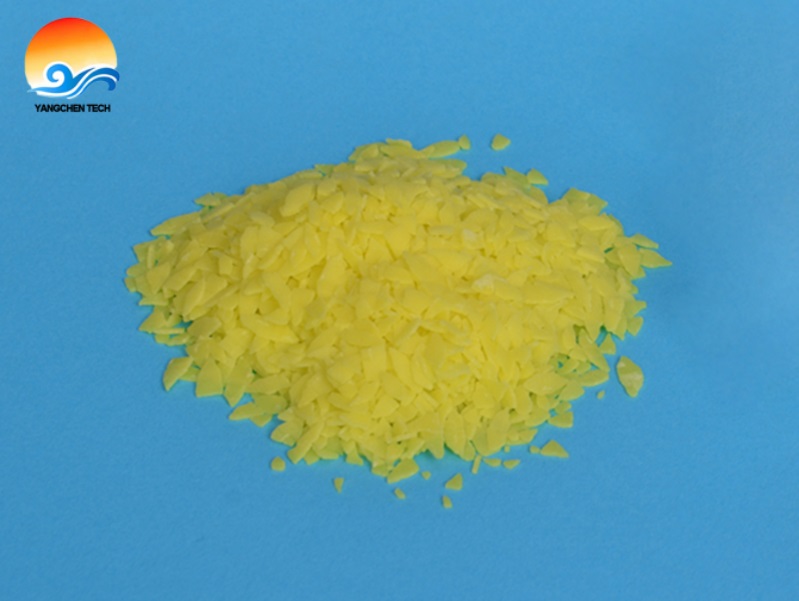N-Phenylmaleimide (abbreviated N-PMI), also known as monomaleimide,(C₁₀H₇NO₂, CAS 941-69-5) manufactured by Yangchen Tech used as a high-performance polymer synthetic monomer and modifier. Structurally, N-PMI features a maleimide ring bonded to a phenyl group, making it highly reactive in both free-radical and ionic polymerizations. It is produced as a pale yellow crystalline powder (melting point \~88–90 °C) and is valued for its ability to impart heat resistance, mechanical strength, and unique functional properties to resins and plastics. N-PMI also exhibits photosensitivity and biocidal (disinfectant) activity, which has led to its use as a bactericide, fungicide, and antifouling agent in coatings.
Chemical and Functional Properties
Heat Resistance: N-Phenylmaleimide greatly improves thermal stability when copolymerized with vinyl monomers. Even small additions (≈1–5% by weight) to ABS, PVC or PMMA resins can raise the heat distortion temperature (HDT) by \~2 °C per wt% of N-PMI. For example, incorporating 10% N-PMI into ABS can elevate its heat-resistance to about 125–130 °C. In comparative studies, N-PMI–modified ABS achieved HDT near 150 °C, whereas typical α-methylstyrene modifiers cap around 115 °C. This high thermal stability makes N-PMI a preferred heat-resistant ABS modifier and engineering polymer additive.
Mechanical Properties: N-Phenylmaleimide enhances the mechanical strength and stiffness of polymers. Copolymers containing N-PMI show higher tensile strength, hardness, and impact resistance than unmodified plastics. It also improves melt-flow and processability, enabling easier molding and extrusion without degradation.
Specification
| Appearance | Melting point | Purity | Solubility |
| Yellow crystalline powder or flakes | 85-90℃ | >99% | Soluble in organic solvents |
Chemical and Flame Resistance: When added to resins, N-PMI increases chemical resistance against acids, bases and solvents. It also has inherent flame-retardant character; incorporating N-PMI into a polymer matrix can improve the material’s fire resistance, a critical property for electronics and construction applications.
Photosensitivity and Biocidal Activity: N-Phenylmaleimide is used in photosensitive resins and coating formulations due to its ability to undergo UV-initiated polymerization. Uniquely, it possesses disinfectant properties – it is listed as a *bactericide, fungicide and underwater organism repellent*. This makes it useful as an antifouling additive in marine coatings and as an intermediate in agricultural chemicals (e.g. plant-growth regulators and pesticides).
Solubility
N-Phenylmaleimide is highly soluble in many organic solvents (e.g. acetone, DMF, benzene), facilitating its use in reactive extrusion and solution polymerizations. In summary, its combination of heat resistance, mechanical reinforcement, flame-retardancy and biocidal effects make N-phenylmaleimide a versatile monomer and modifier in advanced polymer systems.
| Chemical Structure |  |
| Chemical Formula | C10H7NO2 |
| Molecular Weight | 173.16 |
| CAS No. | 941-69-5 |
| Packing Type | Paper bag (20 kg) |
Applications in Polymers and Alloys
- N-Phenylmaleimide manufactured by Yangchen Tech is primarily used as a comonomer modifier to produce heat-resistant plastic alloys and copolymers.
- Heat-Resistant ABS (Acrylonitrile-Butadiene-Styrene): N-PMI is widely added to ABS resin to create *N-PMI–modified ABS*, often called heat-resistant ABS. The maleimide group copolymerizes with styrenic monomers, greatly improving HDT and thermal stability. Even 1% N-PMI raises ABS HDT by \~2 °C. N-PMI–ABS finds use in automotive parts (dashboards, engine covers), electronics housings and any application requiring high-temperature performance.
- PVC and PVC/ABS Blends: Blending N-PMI into PVC or PVC/ABS alloys increases softening temperature and heat deflection. For example, N-PMI improves the heat resistance of PVC-ABS compounds used in television and office equipment housings.
- PMMA (Acrylic Resins): In polymethyl methacrylate (PMMA) and other acrylic resins, N-PMI copolymerization boosts thermal endurance. N-PMI-modified PMMA is suitable for optical components (discs, lenses) and lighting parts that must withstand higher service temperatures.
- Engineering Plastic Alloys: N-PMI is incorporated into blends of engineering plastics such as polyamide (PA), polycarbonate (PC), and PBT. These polymer alloys – used in automotive and appliance components – gain improved thermal stability from N-PMI modification.
Please consult us for more information about N-Phenylmaleimide polymer applications.Welcome Inquiry!
